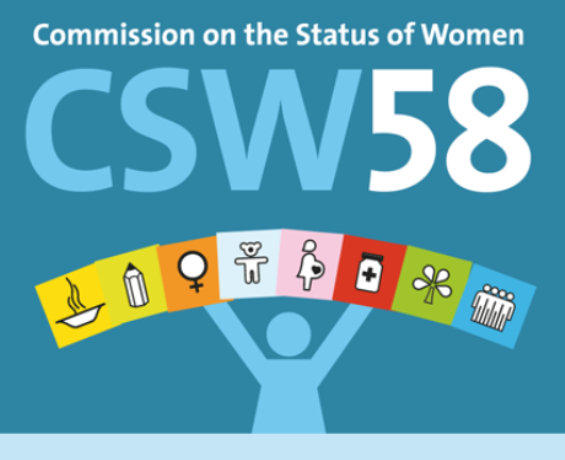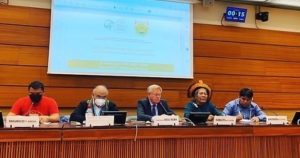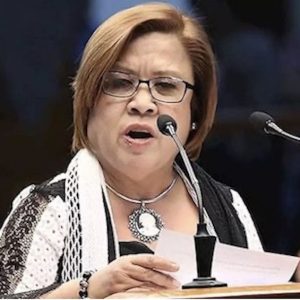Statement submitted by the Nonviolent Radical Party, Transnational and Transparty (NRPTT) and No Peace Without Justice (NPWJ) in the framework of the 58th session of the Commission on the Status of Women (CSW)
“Intensifying global efforts to eliminate female genital mutilation”
Female genital mutilation is one of the most widespread and systematic violations of the universal human right to personal integrity, committed against millions of women and girls worldwide, abusing their physical and psychological integrity and damaging their lives irreversibly. It is an affront to human dignity and a violation of fundamental human rights, the geographic reach of which is now understood to extend well beyond those countries historically considered to be its bastions.
The development of political will at the highest levels, encouraged by and in turn encouraging grass-roots action, is a key achievement in the fight against female genital mutilation over the past decade. The consensus adoption of resolution 67/146 by the General Assembly on 20 December 2012 was a momentous step forward in focusing international political will on the battle against this human rights violation. The NRPTT, together with NPWJ, the Inter-African Committee on Traditional Practices and other non-governmental organizations, continues to carry forward the international campaign that led to the adoption of the resolution, focusing now on its implementation.
Resolution 67/146 is pivotal because it recognizes that female genital mutilation is a human rights violation, acknowledges its gravity and effect on the lives of millions of people and demonstrates clear commitment and political will at the highest levels to combat it. It mirrors and can strengthen important steps already taken at the regional level, such as the Protocol to the African Charter on Human and People’s Rights on the Rights of Women in Africa, which requires States parties to adopt all political and legislative measures necessary to eliminate female genital mutilation completely.
Resolution 67/146 strengthens the development of a political and social environment that challenges attitudes and behaviour with regard to female genital mutilation and facilitates its elimination. It does so by recognizing female genital mutilation for what it is, a form of sexual violence against children and women, and helping to shift the discourse, and the required response, accordingly. Resolution 67/146 also helps to strengthen the development of a legal environment that can support and lead political and social commitment to ending female genital mutilation, legislation being a clear, unequivocal and tangible sign of the State’s commitment to eliminating the practice. Vitally, the resolution recognizes that legislation banning female genital mutilation is of primary importance in providing the framework for action, urging States to take all necessary measures, including enacting and enforcing legislation, to prohibit female genital mutilations and to protect women and girls from this form of violence, and to end impunity.
Not least, resolution 67/146 reinforces the efforts of the thousands of activists working at the national, regional and international levels to see female genital mutilation consigned to the history books. It celebrates those who were brave enough to speak out against female genital mutilation when it was a taboo to do so and heartens those who still work in such environments, often at great personal risk. It both encourages and provides legitimacy for those working for the enactment of and compliance with legislation prohibiting the practice, aiding their struggle by showing that the international community is firmly on their side. It acknowledges the courage of the women and girls who have said no to female genital mutilation and helps to give confidence to those who want to say no but have lacked the support to do so.
Following the adoption of resolution 67/146, it is now of vital importance to ensure its full implementation and give substance to this historic success. To this end, the NRPTT, together with NPWJ, urges Member States and specialized agencies to foster and facilitate maximum outreach about its existence and contents and swift translation of its principles and provisions into effective national laws and regional and national programmes of action. It is further necessary to enhance cooperation among all organizations focused on female genital mutilation, improve the exchange of information and synergy of action and boost the context and framework for community-level activism. This, in the end, is the crux of the matter: the impact of resolution 67/146 lies not in the halls of buildings in New York or Geneva, but in the lives of ordinary people, many of whom will never visit those buildings but who look to the United Nations, its Member States and agencies to help to make their world a better place.
The NRPTT and NPWJ, together with their partners, remain engaged in raising awareness, supporting victims and assisting women and girls who are at risk. We call upon Member States and United Nations bodies to boost collaboration with all sectors and levels of society to speak as one and take an unequivocal and joint stance.
- Download the Statement (pdf format)
For more information, contact Alvilda Jablonko, Coordinator of the FGM Program, ajablonko@npwj.org / phone: +1 347 476 2327 or +32 494 533 915, or Nicola Giovannini on ngiovannini@npwj.org or +32 (0)2 548-39 15.




